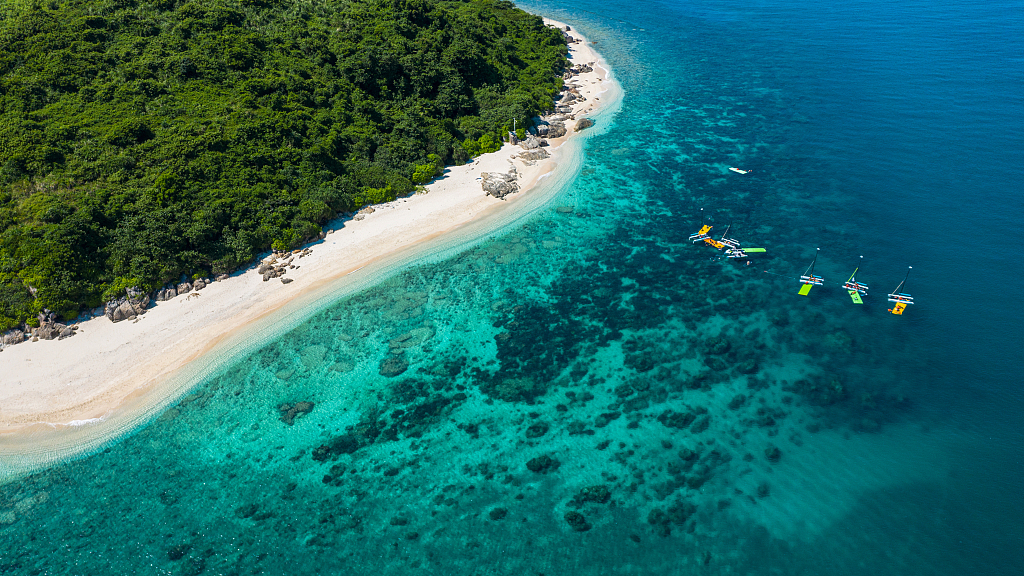Philippe Gourbesville: For a joint climate-water agenda
IAHR President Prof. Philippe Gourbesville posted this article on December 9, 2023 on Opinion of the China Global Television Network (CGTN), a multi-language and multi-platform Chinese media grouping formerly known as CCTV. Below are the copied texts and images from the CGTN website.
--------------------------------------------------

CFP
On August 23, 2023, the 28th session of the Conference of the Parties to the United Nations Framework Convention on Climate Change (COP28) UAE Presidency announced priorities to drive water up the climate agenda. In fact, the COP28 Water Agenda has identified three priority areas for programming at Water Day during the two-week thematic program: conserving and restoring freshwater ecosystems, enhancing urban water resilience, and bolstering water-resilient food systems.
The water agenda is a positive move within the COP process and was expected by the water professional community after the UN 2023 Water Conference held in March at the UN Headquarters in New York, which saw the adoption of the Water Action Agenda. In a synthetic way, the emphasis should be on accelerated implementation and improved impact towards achieving Sustainable Development Goal (SDG) 6: Ensure access to water and sanitation for all and other water-related goals and targets, looking at content, process, and structure.
Innovation is one of five key accelerators that should help to reach the 2030 objectives and potentially the most important one. This speed-up of the current pace is needed because by 2050, according to the UN, an estimated six billion people will face water scarcity due to climate change, pollution and increasingly unsustainable consumption and production. For all these reasons, it is essential to coordinate the climate and the water agendas. COP28 is an opportunity to engage coordination and to develop the needed holistic approach.
At first, it is essential to recognize that climate change is primarily a water crisis. The recent climate evolution is driving an increase in extreme weather events that are inducing water scarcity, unpredictable damages and an increase of vulnerability regarding pollution during floods and even all three simultaneously. The economic development, people's access to water and sanitation, and biodiversity are affected by the impacts throughout the water cycle.
At the same time, the stored freshwater in glaciers, ice caps and snow coverage is rapidly disappearing. The cold meltwaters are increasing the flows within the major river systems and reshaping the annual flow patterns.
The climate crises in recent years have strongly destabilized local communities, and triggered civil unrest and migration in numerous cases, especially in areas characterized with lower resilience. At the same time, the destruction of vegetation has exacerbated the soil erosion processes. It has reduced the groundwater recharge, contributed to increasing water scarcity and affected food security.
At the international scale, the water demand is still growing. Despite efforts engaged by numerous water services providers that are targeting energy neutrality, – or even energy production – the large demand contributes to the degradation of critical water-dependent carbon sinks such as marshlands and peatlands for the inland waters and lagoons and mangroves for the coastal areas.
In parallel, the food production still relies on water-intensive agriculture. 60 percent of the freshwater is used for irrigation systems that have frequently low efficiency regarding the quantity of water and energy used. Similarly, the water demand is pushed forward with the meat production and the crops used as biofuels. Both exacerbate water scarcity.
To address those issues, sustainable, affordable, and scalable water solutions should be promoted and implemented urgently. The solutions should integrate the following key actions: reshaping agriculture with a climate-smart approach. The conservation of soil moisture should be a priority to increase the organic matter and reduce post-harvest losses. These techniques must be associated with drip irrigation and the use of wastes for nutrients and biofuel production.

A cereal field with spring barley on very dry soils is artificially irrigated in the Hanover region, Germany, June 14, 2023. /CFP
Engaging systematic wastewater reuse. Treated wastewater represents resources that can be mobilized for irrigation and industrial applications. With an efficient monitoring system – totally affordable even for developing countries today – the treated waters are a sustainable source of water and can help reduce energy consumption for water services with no impact on the natural environment.
Optimizing groundwater uses. Due to a lack of monitoring and careful management of pumping activities, the groundwater resources are depleted and frequently polluted. These resources must be actively protected and restored because they represent a major asset regarding climate change and can provide an answer to the needs of a growing population.
Mobilizing carbon storage in hydro environments. Hydro environments are major carbon-storing assets. In the inter-tropical convergence zone, the soils with the mangroves can keep up to three or four times more carbon than terrestrial soils.
Preserving natural interfaces. The complex ecosystems located at the interface of oceans and shorelines can help regulate water flow, reduce erosion and limit flooding during extreme events.
Collecting rainwater. With effective monitoring of quality, the collection and storage of rainfall can help to develop resilience for communities exposed to long and irregular dry periods.
Climate policymakers must include water issues at the heart of action plans that are discussed within the climate change mitigation strategies. A holistic water management will help society adapt to climate change by improving resilience, protecting health, and saving lives.
In an obvious way, decision-makers should cooperate at a catchment scale to balance the water needs of communities, agricultural and industrial sectors, and natural environments. Improvement is deeply needed in the financial sector. Innovative financing for water resource management is requested to help attract investment, especially in developing countries.
The COP28 is an important opportunity to raise those issues and to develop the climate-water actions agenda urgently needed. During the first days of the COP28, the "loss and damage fund" has been successfully established, representing a major step forward regarding the development of resilient societies. Let's hope that this positive dynamic will be extended up to the end of the conference.
--------------------------------------------------